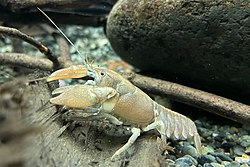Biology:Cambaroides japonicus
| Cambaroides japonicus | |
|---|---|

| |
| Scientific classification | |
| Domain: | Eukaryota |
| Kingdom: | Animalia |
| Phylum: | Arthropoda |
| Class: | Malacostraca |
| Order: | Decapoda |
| Suborder: | Pleocyemata |
| Family: | Cambaroididae |
| Genus: | Cambaroides |
| Species: | C. japonicus
|
| Binomial name | |
| Cambaroides japonicus (De Haan, 1841)
| |
Cambaroides japonicus, also known as Japanese crayfish (ニホンザリガニ Nihon zarigani), is a species of crayfish endemic to Japan .[2]
They are small in size (6 cm) and grayish in color. Its front claws are much weaker than the American crayfish, which is an invasive species in Japan. The Japanese crayfish needs low temperature and high water purity, so they live in upper streams of rivers or lakes in highland regions. These crayfish often burrow alongside the riverbank when breeding and hibernating. Studies have shown that Cambaroides japonicus preferentially select artificial burrows based on their relative size, leading to the conclusion that burrow patterns are related to size characteristics of the organism.[3] The distribution of Japanese crayfish comprises Hokkaidō and northern Tōhoku (the northern area of Honshū).
The Environmental Agency (now Ministry of Environment) of Japan added it as a vulnerable species (IUCN category) to the Red Data List in 2000. It is thought that the causes of its decrease are corruption of water quality and the spread of the United States crayfish Pacifastacus leniusculus, which was imported in the 20th century and has steadily proliferated in northern Japan.[4] Some suspect that this American crayfish carries some disease, such as the crayfish plague known in Europe, that eliminates endemic crayfish.
References
- ↑ Kawai, T.; Machino, Y. (2010). "Cambaroides japonicus". IUCN Red List of Threatened Species 2010: e.T153751A4540770. doi:10.2305/IUCN.UK.2010-3.RLTS.T153751A4540770.en. https://www.iucnredlist.org/species/153751/4540770. Retrieved 20 November 2021.
- ↑ Tadashi Kawai; Gerhard Scholtz (2002). "Behavior of juveniles of the Japanese endemic species Cambaroides japonicus (Decapoda: Astacidea: Cambaridae), with observations on the position of the spermatophore attachment on adult females". Journal of Crustacean Biology 22 (3): 532–537. doi:10.1651/0278-0372(2002)022[0532:BOJOTJ2.0.CO;2].
- ↑ Nakata, Kazuyoshi; Hamano, Tatsuo; Hayashi, Ken-Ichi; Kawai, Tadashi; Goshima, Seiji (2001). "Artificial burrow preference by the Japanese crayfish Cambaroides japonicus". Fisheries Science 67 (3): 449–455. doi:10.1046/j.1444-2906.2001.00281.x. https://www.jstage.jst.go.jp/article/fishsci1994/67/3/67_3_449/_article.
- ↑ Kazuyoshi Nakata; Akira Tanaka; Seiji Goshima (2004). "Reproduction of the alien crayfish species Pacifastacus leniusculus in Lake Shikaribetsu, Hokkaido, Japan". Journal of Crustacean Biology 24 (3): 496–501. doi:10.1651/C-2484.
Wikidata ☰ Q13403251 entry
 |


